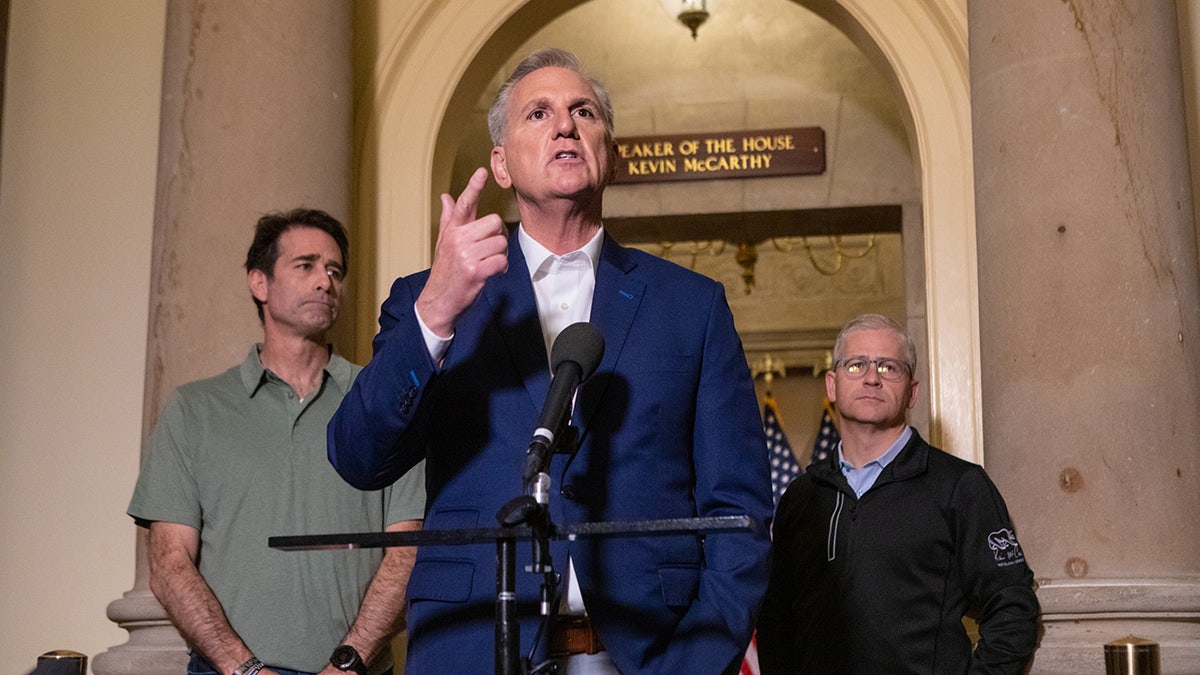More Democrats voted for debt ceiling bill than did Republicans: Chad Pergram
Fox News senior congressional correspondent Chad Pergram has the latest details on the House passing the bipartisan debt ceiling bill on 'Hannity.'
The Senate now has the debt ceiling package approved overwhelmingly by the House Wednesday night.
The upper chamber of Congress could easily step on the gas and try to sync up with the House and pass the bill late Thursday or in the wee hours of Friday morning. It is possible, however, that the process could bleed into Friday, if not consume the entire weekend.
House Speaker Kevin McCarthy's negotiators reached an agreement with the White House earlier this week on a deal to raise the debt limit and reduce some spending — though the limitations were far less far-reaching than many in the GOP had wanted.
The Senate has just days to consider it before June 5 — the date when Treasury Secretary Janet Yellen said the U.S. could default on its debt obligations if lawmakers did not act in time.
The timing of the Senate's passage will hinge on whether the sides can work out a time agreement as well as an accord on what amendments, if any, are in order and debate time.
Sens. Mike Lee, R-Utah, and Rand Paul, R-Ky., would like to offer alternative proposals and are likely to get floor time to speak. Sen. Tim Kaine, D-Va., could seek an amendment regarding permitting and the Mountain Valley Pipeline. There are a host of other amendment proposals out there.

Speaker of the House Kevin McCarthy (R-CA) speaks to the press after an "agreement principle" was reached between House Republicans and President Biden's team to avoid a default on the U.S. debt at the U.S. Capitol on May 28, 2023 in Washington, D.C. The agreement still needs to pass through both the House and Senate. (Anna Rose Layden/Getty Images)
Senate Majority Leader Chuck Schumer, D-N.Y., would not directly answer a question yesterday whether he would consider amendments to the bill. Schumer simply stated that the bill could not be changed. The bill must go back to the House if there were alterations. That is unworkable in this scenario unless the nation would flirt with hitting the debt ceiling.
BIDEN, MCCARTHY REACH DEBT CEILING DEAL TO AVOID DEFAULT: HERE’S WHAT’S IN IT
What often unfolds in this scenario is the Senate forges an agreement for the consideration of a batch or amendments or floor time for senators to speak. If a senator demands a roll call vote on their amendment, part of the pact is to subject the amendment to a 60 vote threshold for adoption. That usually guarantees that the Senate will not approve a given amendment, thus altering the bill.
The Senate must also score 60 votes to overcome a filibuster.

Senate Majority Leader Chuck Schumer, D-N.Y., speaks during a news conference at the Capitol in Washington, Monday, April 17, 2023. President Biden and his top congressional allies, Schumer and House Democratic Leader Hakeem Jeffries, say they are unwilling to negotiate over the debt ceiling. (AP Photo/J. Scott Applewhite, File)
It will take time to cobble together an agreement for debate and amendments. Plus, it will consume a chunk of time to actually debate the amendments and vote, but working out an arrangement which finishes the bill late tonight or overnight is not out of the question.
Also, if opponents are dug in, they could suspend passage the old-fashioned way with lengthy floor speeches, refusing to yield. Or, senators could require the Senate to burn hours and hours of procedural clock time, dragging this into the weekend.
However, there appears to be an appetite for the Senate to conclude this sooner rather than later, before the weekend.
Once the Senate passes the bill, the House and Senate are on the same page. The measure then goes to the president for signature.
After the deal was announced, Biden said the bill "represents a compromise, which means no one got everything they wanted."
CLICK HERE TO GET THE FOX NEWS APP
The bill would keep nondefense spending roughly flat in the 2024 fiscal year and increase it by 1% the following year, as well as provide for a two-year debt-limit increase.
The agreement would expand some work requirements for the Supplemental Nutrition Assistance Program, or SNAP, formerly known as food stamps. It would raise the age for existing work requirements from 49 to 54, similar to the Republican proposal, but those changes would expire in 2030. The White House said it would at the same time reduce the number of vulnerable people — including veterans and people who are homeless — of all ages who are subject to the requirements.
Fox News' Bradford Betz contributed reporting















































